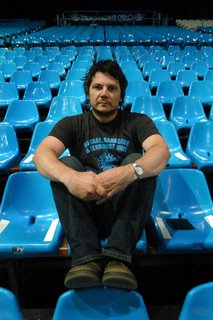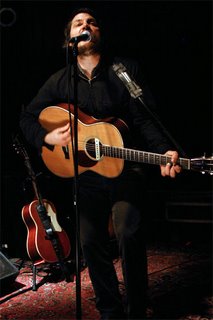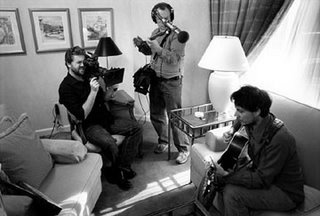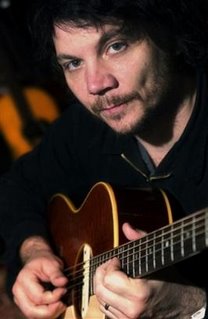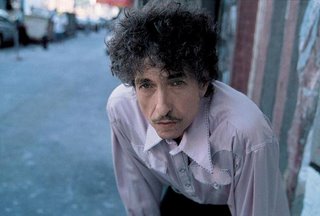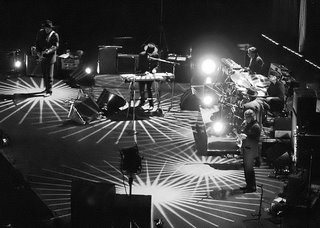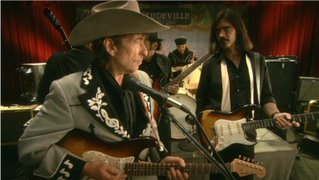
“I say it so it must be so”
(Bob Dylan)
“The question is not so much: “Is this a good Dylan album?” – which it is – as “Is this a Dylan album?” – which it isn’t.
(Eyolf Østrem)
Back in the late 80s, when the Rolling Stones went on the road for the first time in about 7 years and after being about to disband, Keith Richards said something like: “This is an interesting moment for all of us. Rock’n’roll music is always intended to be music for teenagers; now (Keith and the boys were in their late 40s) is the moment to go out and test to see if rock’n’roll music can be something good even for adults”.
That from Keith was a promise for all of those, like myself, who grew up during the 60s or the 70s. It was opening up a completely new territory. It was a promise that we would not be abandoned after a decade so musically disappointing as the 80s had been, where nearly all of our rock’n’roll dreams died; killed, in the main, by the same musicians we had trusted for such a long time: The Stones, the surviving members of the Beatles, Neil Young, Lou Reed and Bob Dylan himself who wandered through that decade in complete artistic confusion. Maybe it was Keef’s words that made those people produce some great albums at the end of the decade, or maybe it was just the turning of a new decade that sent them to do their homework and consequently create some of their best work ever (such as the albums New York and Oh Mercy).
Of course, it was not about how immortal (and for adults) music like the ones recorded on albums such as Beggars Banquet, Rubber Soul, Blonde on Blonde or Highway 61 could be; that music will always remain music for the mind, music for kids and adults of every past and future generations. Richards’ words were more about the people who 20 or 25 years ago wrote and recorded those masterpieces, to see if, now in their late 40s, they were still able, as they were getting older, to remain faithful and honest to their original musical vision.
In the years after those Keef words, it seems now that those words are about a missing promise. Although Neil Young still gave us a couple of worthwhile albums in the last decade, it was nothing more than that; so too Lou Reed who, in a couple of albums like Magic and Loss and the already quoted New York, was able to record some of his best work ever (‘but only in those two? – note by Andy ☺)’). The Stones, McCartney, never recorded a collection of songs that could be put in the same fields of the music they wrote and recorded when they were in their 20s; their shows now are more like a Disneyland affair than a real rock concert (and with tickets so expensive, their concerts can only really be vafforded by people of the same age: music for adults, indeed). Last kids on the block, The Who – or the surviving members of The Who – have just produced their first original work after a good 20 years. Do we need this Endless Wire thingy? Not really. In the last ten years, Van Morrison has made a long string of one, two, even three albums each year which contain barely enough good songs to create a decent single album.
Talking about this, Pete Townshend, on his official website, recently said: “I heard some tracks from Bob Dylan’s new CD on BBC radio last night. They are great. (…). The critics were favourable about the way Bob Dylan is facing his ageing process and is remaining connected with his ageing audience. (…) Rock’n’roll – and Bob Dylan exploded from the slowly evolving folk traditions of Dave Van Ronk and Ritchie Havens and embraced the rock form by sheer force of will – is getting old. If it embraces the issues of ageing, it will age. Or would you say it is becoming universal now, free of limitation and constraint? Against all the odds I put up in my own jaundiced middle-age, rock is not dead”. Well, if you say so, Pete…
Last year, when Paul McCartney’s Chaos and Creation in the Backyard, the Rolling Stones’ A Bigger Bang and a new 60s Bob Dylan live collection came out at the same time, David Lister (The Independent), wrote that “(…) the '60s icons have lost some of their gift for songwriting. As The Independent's rock critic pointed out in his review, McCartney's album has hardly any tunes and forgettable lyrics. The Stones' album is cheered, only because it is of a reasonable standard, but no one can name a single song from it. Dylan's gets raves, but then it is an album of bootleg recordings from the '60s. The truth is that the aging process in rock stars does not particularly affect live performance, even though that is what is always wrongly seized upon. But, more than in any other art form, it does seem to affect the writing and composition. Dylan's recent albums have been worthy with the very occasional standout track. But how amazed would the world be if "Mr. Tambourine Man" or "Like a Rolling Stone" were released now. They are from a different planet. McCartney has written nothing remotely comparable to "Penny Lane" or "Eleanor Rigby" for decades. But why can't it happen? These are the same people with the same talent. It is in pop and rock that things seem to take a wrong turn with the onset of middle age. Elton John's last album was something of a return to form. He said he had had a long think and admitted to himself that nothing he had done in the past 30 years or so had matched the songs of his vintage period of 1970-76. It was a painful admission to have to make to himself, but it meant that he made an extra effort with the new one. Perhaps, before their next albums, McCartney, Jagger and Dylan should listen to one of their vintage works and not only try to match it but also try to work out why rock composers lose their way. I don't know the answer either. But this slightly eerie echo of the '60s provides evidence that rock composers lose it at far too young an age.”
Bob Dylan found out the shortest way: he went away, in another life and time (check his radio show on XM Radio and you’ll know what I mean). He already told us about this once: “Well, I'm livin' in a foreign country but I'm bound to cross the line.” He did indeed cross that line. To quote another song, he lives “in another world” now. Since Time Out Of Mind, step by step, through Love and Theft, and finally with Modern Times, he decided it was better to go to the pre-rock’n’roll era kind of music. It is probably a way to say that rock’n’roll music, as it was intended in the 60s, was a closed chapter anyway. Whoever decided to print the Columbia 30s label on Time Out Of Mind, surely was thinking about this.
Bruce Springsteen seems to be on Dylan’s same wave length (check his last album, The Seeger Sessions; by the way, I haven’t included Springsteen on the previous list of artists, just because Bruce is from a different generation, but I have no hesitation in citing him as the most relevant and significant rock musician of the last years, since his return to form with The Rising, the fine Devils & Dust and his recent triumph with The Seeger Sessions Band’s tour).
In doing this, Bob Dylan did something that many fans think is offensive: to simply steal other artists’ songs. Of course, pre-rock’n’roll era songs… As Eyolf Østrem wrote on his website, www.dylanchords.com : “At the time of writing (Wed 20 Sept, 16:08 CET), the following songs on Modern Times have known models for their music:
* Rollin’ and Tumblin’ • Taken from Muddy Water’s version of Hambone Willie Newbern’s “Roll and Tumble Blues” from 1929.
* When the Deal Goes Down • based on Bing Crosby’s trademark song “Where the Blue of the Night (Meets the Gold of the Day)” by Roy Turk and Fred E. Ahlert
* Beyond the Horizon • Taken from Jim Kennedy’s “Red Sails in the Sunset”
* The Levee’s Gonna Break • taken wholesale (apart from a few new lines of lyrics here and there) from Kansas Joe & Memphis Minnie’s “When the Levee Breaks” from 1929.
* Someday Baby • taken from “Worried Life Blues” (aka “Someday Baby” or “Trouble No More”), performed by Sleepy John Estes, Fred McDowell, Lightnin’ Hopkins, Muddy Waters, Chuck Berry, Eric Clapton, the Animals, and Bob Dylan himself (Toad’s Place, 1990), just to mention a few.
“These are not just influences: in all cases, the chord structure is lifted from the models and the melody is clearly recognizable, and in some cases, the whole arrangement is “borrowed” (…) When Dylan w/band play the exact same notes and the exact same solos as Muddy Waters did on “Rollin’ and Tumblin’”, that’s not “intuition” or creative translocation, it’s just “letting Muddy do the job”, plain and simple. That doesn’t add to my appreciation of the work – on the contrary. Putting the label “All songs by Bob Dylan” on this CD is plain indecency.”
Personally, I would add that Thunder on the Mountain is just Let it Rock, by Chuck Berry (but if anyone is blaming Bob Dylan because Thunder on the Mountain is a Berry rip off, I’d like to remind them that one of the greatest 60s song, Subterranean Homesick Blues, was already a Chuck Berry rip off. The question instead should be: why Chuck Berry needed to sue John Lennon for his Come Together and never had problem with Bob Dylan stealing his music?). And it should be remembered that a masterpiece like The Freewheelin’ Bob Dylan doesn’t have any original music by Bob Dylan (‘none?’ - note by Andy. I still believe so, am I wrong? note by me).
It had already happened with “Love and Theft”. Nothing new, some people said. A lot of songs on masterpieces like Highway 61 Revisited or Blonde on Blonde are just old blues numbers “revisited”. But what once was the willingness to capture the old music with a fresh, young, hip attitude and to reinvent that music for the “modern times” (aka the 60s), now seems to many simply a man who can’t invent anything new under the sun, not even a new arrangement for an old Muddy Waters song.
About the so-called theft Bob Dylan has been doing in recent years, both here and on “Love and Theft”, this little story might be interesting to show how Bob Dylan’s mind is set about songs. Back in 1999, when the last CSN&Y album came out, I met Stephen Stills for an interview. I asked him about the song Seen Enough on the album, and that it was clearly just like Bob Dylan’s Subterranean Homesick Blues (which, as we already said, is based on Chuck Berry’s Too Much Monkey Business). After the song’s credits “music and words by Stephen Stills”, it is written “inspired by Bob Dylan”. I asked Stills about that song. He told me he had that melody in his mind for a long time (I bet: maybe since 1965…) and honestly didn’t remember it was from a Bob Dylan song, that he had forgotten about that Dylan song anyway. When someone made him aware of the song, he asked Dylan if it was ok to write: “words by Stephen Stills, music by Stephen Stills and Bob Dylan”. Dylan said, “No, its ok, don’t include my name on it, just your name”. Stills thought, though, it would be nice to include “inspired by”, just to be fair.
You may also remember Neil Young’s Days That Used to Be on his 1990 Ragged Glory album is Dylan’s My Back Pages note for note but Bob Dylan never protested with Neil about it. I could list a thousand songs that are identical to Bob Dylan songs (the American songwriter Dan Bern should know a thing or two about this…). (‘a very good point’, note by Andy ☺)
Maybe for Dylan, taking other people songs is just the same as people taking from his songs: I can use this Muddy Waters song, Stills can use my music, Neil can use it, and anybody can do it this way. Just like when he took Dave Van Ronk’s Baby Let Me Follow You Down arrangement, maybe? Music is free, for him. But maybe Dylan could have added “inspired by Muddy Waters” on his albums credits, too.
While I can see perfectly Mr. Østrem’s point, I personally think that, while we are a million miles away from the genius of Highway 61 Revisited, what we have on Modern Times is something that works quite well for a 65 year old man.
I think Bob Dylan has finally reached the sound he has been looking for years. He has nothing to prove and nothing to declare anymore (“I already confessed” he says on Thunder on the Mountain “don’t need to confess again”) musically speaking. I also think that in some moments of the NET, he already reached that sound: I’m thinking about the perfect acoustic sets in 2000, when Larry Campbell and Charlie Sexton were in the band, where the music of the pre-rock’n’roll era was such an important and defining moment of those shows.
Modern Times could be the third millennium basement tapes. The feeling I get from songs like Spirit on the Water, with all the instrumental mistakes that are on it but also with the totally dedicated vocal performance, is the same I get from many Basement Tapes’ performances. This is Bob Dylan singing for himself more than for an audience, just like during the Basement Tapes recordings or the sound on one of the first albums by The Band. Workingman’s Blues is a song that only waits for Richard Manuel, Levon Helm and Rick Danko to come out of the darkness and make it their own song. If only they could. The vision is the same to me. It is “That old weird America” where Bob Dylan has been living for quite a number of years.
Where Bob Dylan is mostly having a great time, is in the way he is busy with old blues numbers. For a man who was called “the greatest white blues singer” (Bonnie Raitt, after Dylan’s performance at the 2002 Grammy, said “Bob Dylan is more funky than any black musicians around these days”) since Time Out Of Mind and now more than ever, Bob Dylan is in a full blues immersion. While the blues numbers on “Love & Theft” could have seemed a little too forced, with the heavy guitar riffs, the blasting and pumping of the drums so much in front and with little vocal inventions, for someone like me who never was a big blues fan (Well, having said I like the Chicago blues a lot, actually. It is the same kind of blues Bob Dylan is playing on Modern Times, so maybe that’s why I like the blues numbers on Modern Times so much.) On Modern Times, I think Dylan has finally found a way to sing the blues in a magnificent way, like Blind Willie McTell, say.
Throughout his career, except maybe when he was covering blues artists like the great Tampa Red or Willie Dixon – again – during the 1978 tour, or some fall 1992 blues covers – its Muddy Waters – Dylan’s way of writing and performing a blues song always seemed too forced, unnatural, sometimes boring, and sometimes hilarious to me. The blues is such a limited musical form. You must have a special power inside to deliver a great blues performance. That was happening during the Highway 61 studio sessions, but I can’t think of anything along the same level in the last 40 years.
I think the way Dylan performs Rollin’ and Tumblin’, Someday Baby and The Levee's Gonna Break, is a pure delight. Relaxed, concentrated, and focused, with the band behind him like a freight train rolling with joy. You can tell he is having the time of his life in those performances, everything that is missing in his contemporary live performances. This is even more than simply blues: these songs have the same Sun Records old music feeling, they are almost rockabilly, a music Bob Dylan always loved. You can hear it on another excellent performance, Thunder on the Mountain: the way the guitars play is perfect rockabilly Sun Records style note by note, and Dylan’s phrasing is wonderful (‘That’s what I thought of “Love And Theft”!’ – note by Andy ☺)
I’m not a fan at all of Dylan’s current live band, but, with the possible exception of Stu Kimball, these players are all excellent. Listen to their work without Dylan and you will understand. The fact that on stage they don’t appear as that, leaves only Bob Dylan to blame. I believe: how can you be good – as good as you are – when you have to stay behind a hilarious organ stomp and a voice (like Bob Dylan’s voice has been for some years now) that can hardly sing a song? Here, in a studio, things are different. The 3 songs I quoted are for me the best performances on MT. The problems, in terms of performances, are on other tracks.
Spirit on the Water is a good example of a song that has not been properly rehearsed, just “play behind me folks”. At the beginning, and sometime during the song, there are a lot of obvious instrumental mistakes, especially the piano part Dylan plays. Nettie Moore, which, as good as the song might be, gets such an awful arrangement. You can hear the violin, here and there (like at the end of Workingman’s Blues) trying to come out, playing two notes and then immediately disappearing, like a player who is trying to play the song without knowing a thing about it. If Workingman’s Blues might have what I consider the most tender and passionate vocal performances Dylan was able to deliver in a decade, the instrumental part is a mess. Who is playing the guitar there? No doubt: it can only be Bob Dylan, while the drummer still has to figure out what to do during the entire song.
Bob Dylan said recently “I’m the only one that knows how to produce my songs.” Well, you think so, Bob. I can only imagine this album with the production of a man like T-Bone Burnette and with a guitarist like Bill Frisell on board… Or Jack White, thinking how good he was with Loretta Lynne. And don’t even make me talk about Rick Rubin… or Brendan O’Brien (though I hate how he overdubbed Dignity, I cannot deny how good he was with Bruce Springsteen’s The Rising). Or Steven Soles, ex Rolling Thunder Revue buddy, who has produced some great albums in the past years.
We all know that when Bob Dylan says that no producer in the past was able to help him it is just bullshit. The legendary words “Go in, cut it and get the fuck out of it” that Bob Dylan said back in 65 shows perfectly what Bob Dylan has always thought about the recording process. Although no one can touch the genius of his songwriting during the mid 60s, no one should have the nerve to deny the help of Bob Johnston for the way Blonde on Blonde came out,. Or what Jerry Wexler did for what is still the best sounding and best performed Dylan album ever, Slow Train Coming. We all know what happened each time Dylan had the last word on production: songs like Blind Willie McTell or Series of Dreams were left out, albums like Knocked Out Loaded or Down in the Groove… Or, to remain in ”modern times”, anyone who has had the chance to listen to the complete Tell Ol’ Bill sessions, can’t help but wonder why the heck Bob Dylan chose the worst version for the official release, ahead of so many far better versions he recorded. It is not an artistic choice, one to autoproduce himself in the case of Bob Dylan, but more a problem with his relationships with other people. As Daniel Lanois said, “to work with Bob Dylan is something I would never wish on anyone…”
In this sense, Beyond the Horizon – though a nice little melody sung quite well by Dylan – is the worst performed song on the entire album: really, other than Dylan’s voice, the only instrument that sustains the entire performance are the drums. The piano keeps beating the same note. The bass is so dull you want to turn the damn thing off. Is that a pedal steel in the background? I still don’t know. The guitar solo is simply useless. There is no dynamic, there is no life in this song. That said, and with that clearly in my mind, I should say that MT is a mission accomplished, for a man of his age that has “been there, done that” etc.
MT was blessed with 5 star reviews all over the world (for those interested, my review in the Italian magazine for which I write, got 3 stars and a half…). As my friend Doug Evans, with whom I have the honour to be a member of the same internet discussion group, said: “There have been rave reviews over the past few years for Dylan, McCartney, Brian Wilson (for a 40 year old work!), even (…) Ringo Starr (Choose Love). At this point in the history of rock and roll, writers seem to be in a difficult position. They are expected to trumpet the arrival of "product" much like an additional marketing arm of a label's PR department. They spend their time listening to music they know has been produced by computers, pushed through "research groups" and spun to quickly reach the biggest audience with the smallest offense. There are few "artists" that can both sell papers/magazines and expect a career beyond a smash album or two. So... when the writers see a survivor of the fab, gear, now-legendary 60s generation producing _anything_, they can't help but loudly applaud because they feel a "reality" that just doesn't exist in most of the music they write about. And perhaps it isn’t even so much about Dylan and the 60s. It might also be about the White Stripes or U2. The writers want rock and roll to be what they think it once was, and grab every opportunity to rave about what they see as "art" as opposed to "product".
The best observations about MT that I have found so far, come from a musician and from a professor of economy. The first, Patti Smith, said the song Ain't Talkin' is “like walking alongside Bob hearing him thinking”. This way, I don’t care how much the lyrics of MT are similar to those of Henry Timrod (which, btw, makes perfect sense: on stage, for years, Bob Dylan has the look of the XIX century riverboat gambler; since L&T, his lyrics are full of references to the American Civil War, and Timrod was the Poet Laureate of the Confederation…). The latest discovery was about the Latin poet Ovid, of which Bob Dylan himself on Thunder on the Mountain quotes his book The Art of Love. Some of his lines are here and there through the lyrics of MT. At least, as the always smart Andy Muir noted in the same Internet discussion group, “now we are not afraid to call Bob Dylan ‘a classic’ anymore…”
I really can’t believe that Bob Dylan’s attitude, these days, when he has to write a song, is to take 30 or 40 books from his bookshelf and pick lines randomly here and there. The Bob Dylan way of writing has always been one to take notes in his mind from whatever he heard or read here and there: from a coffee table, from tv, from newspapers.
"I wrote these songs in... a trancelike state. This is how I feel? Why do I feel like that? And who's the me who feels this way?” said the man himself.
The other observation I found is from an Italian professor of Economy, not really a music writer, Mr. Giulio Sapelli and it was a revelation. This person took a great care in analyzing each Modern Times lyric. In his vision, Modern Times is a sort of concept album dedicated to the every day working class hero. His review starts out from TS Eliot ‘La sepoltura dei morti’, from The Waste Land. For Mr. Sapelli, Dylan, musically, is singing like a rhapsody of old Jewish Psalms and some ancient Christian tune.
For him, Dylan, on Modern Times, is singing of the life and the desolation of the American working class from a universal point of view. That workingman class that is gone from social sciences and collective imagination. Dylan is giving us a lesson of realism and moral nerve and mixes religious meditation with the most normal every day life.
After TS Eliot’s Waste Land, there is only the desert that comes out, and that is where the MT character is wandering: art goes before the science (Dylan, in a 2001 Rolling Stone interview: “I mean, art imposes order on life, but how much more art will there be? We really don't know. There's a secret sanctity of nature. How much more of that will there be? At the moment, the rational mind's way of thinking wouldn't really explain what's happened. You need something else, something with a capital E, to explain it. It's going to have to be dealt with sooner or later, of course.”)
When the Deal Goes Down, for Mr. Sapelli, is like “When the shift will end”, a job without meaning, useless, a continuous feeling alienated from life itself: “We live and we die, we know not why, but I’ll be with you when the deal goes down.”
Spirit on the Water, like many have observed, gets the title from Genesis: the story of a personal drama, a killing, a pain that is remorse and sin, mixed with the thought of a woman in the Dylan’s song.
Workingman’s Blues is of course the climax of this vision: Dylan sings about the instruments of every day work (on Thunder on the Mountain he already said: “I’ll plant and I’ll harvest what the earth brings forth, The hammer’s on the table the pitchfork’s on the shelf”), telling what goes on in the mind of a common person who is observing every value of his past life dying.
The faith and the hope in a God who can save us if only he would reveal himself to us comes out here and there. Ain’t Talkin is a hymn of an anarchist revolutionary but at the same time the waiting for a Messiah that Dylan doubts can ever arrive, in an album that talks about the workingman’s class but also of the loss and the redemption of faith, of secularity and of workers’ dignity.
“I think Modern Times is the best ode to the workers condition ever written for many many years. But closer to Ratzinger’s vision than to Karl Marx”, said Mr. Sapelli.
If you take Mr. Sapelli’s point of view, surely the title “Modern Times” makes more sense in reference to the Charlie Chaplin film than a simple joke as many people have claimed: “Modern Times, yes, but old songs haha that funny Bob Dylan”.
To think that for me, after listening to Ain’t Talking for the first few times, that song was an answer to Bruce Springsteen’s Paradise, a trip inside the mind of a suicide bomber… Really, to this day, to know what Bob Dylan is writing about is still a not an easy task.
During the first week after MT was released, I was driving in my car. I turned on the radio and Rollin’ and Tumblin’ came on. You don’t hear Bob Dylan’s songs on Italian radio very often. More than that, you never hear Muddy Waters’ songs on Italian radio. If only for that, I was grateful to Bob Dylan for coming out with an album like Modern Times and letting the Italian radios play, at least for few days, a Muddy Waters song. That, I think, is the real value of Modern Times, keeping alive, if only for a few days, a music that is going to die ,.
* The 'note by Andy' are by the great Scottish writer Andrew Muir, who took a great care in trying to edit this stuff.






